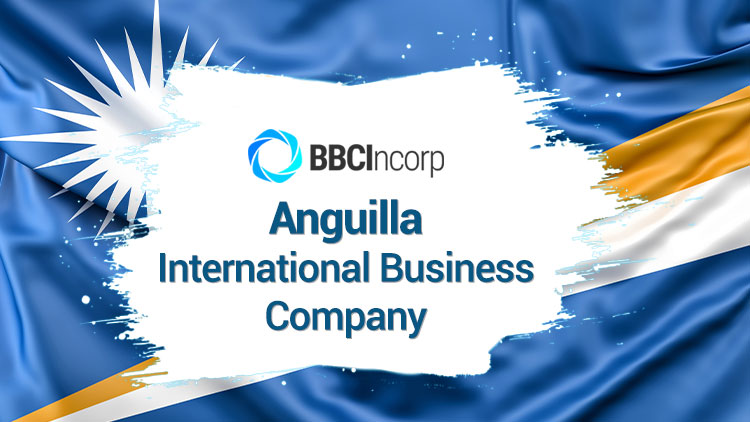
When it comes to offshore jurisdictions, Anguilla must be one of the first names that appears in your mind. Anguilla International Business Company (IBC) is the business entity which has a large number of registers.
Anguilla is a small island in the eastern Caribbean Sea with a small population of 15,161 and English as the main language. More and more entrepreneurs have been flocking to the island to register their IBC mainly for favorable tax policies. Let’s define it and see how to incorporate an Anguilla IBC with BBCIncorp.
1. Key features of Anguilla IBC

Besides Limited Liability Company (LLC), Anguilla IBC is the most popular legal form in the island. An IBC is a company which is registered in Anguilla but conducts business in other jurisdictions outside the island. The business entity has certain characteristics that make it a preferred option for most foreign investors.
Corporate structure. Anguilla IBC is managed by shareholders and directors. The company ownership is based on the stock ownership. At least one director and one shareholder is required to form an Anguilla IBC. There is no limit on the number of shareholders and directors. Shareholders can be natural persons or business entities.
Liability. The shareholders are limited to the number of shares they own.
Types of shares. The island allows the IBC to authorize and issue registered shares and bearer shares in any currency without regard to:
- Par value – the initial price of share
- Voting or non-voting share
- Preferential or common share
Corporate legislation. Anguilla IBC is governed by the International Business Companies Act of 2014 with some amendments in years later. The legal system of Anguilla is based on the English Common Law with local modifications.
Restrictions on Anguilla IBC. Under Anguilla IBC Act, the IBC is not allowed to do some activities as listed below:
- Do business with any Anguilla resident;
- Conduct company management business, a banking or trust business; or act as an insurance company, insurance agent, insurance broker, or insurance manager;
- Own or hold an interest in real property placed in Anguilla.
2. Why incorporate Anguilla IBC

As an offshore destination, Anguilla offers various advantages for foreign companies registered within the border.
Tax neutral jurisdiction. Anguilla IBC as well as its shareholders and members regardless of resident or non-resident status are exempted from any taxes within the border. There is no corporate tax, personal income tax and withholding tax for assets and income originating from other countries out of the island. The company is also not subject to inheritance tax, gift tax, capital gains tax and estate tax.
Layered corporate privacy. Like some other offshore countries, corporate anonymity is maintained in Anguilla. There is no need to disclose personal information such as name and address of shareholders and directors. The country also allows Anguilla IBC to use nominee shareholders and directors.
Separate liability between the IBC and individuals. The company has separate liability between the company itself and its shareholders, directors and other members. They are not liable for the company’s debts and obligations.
Re-domiciling policy. Any foreign business owners can re-domicile their company registration in other countries to Anguilla and be governed by the Anguilla IBC Act whilst maintaining the same legal identity. In turn, Anguilla IBC can also re-domicile to such jurisdictions.
Minimal reporting requirement. There is no need for Anguilla IBC to file annual accounting books and records to the government. The IBC can prepare and keep the records in any jurisdiction in the world for the inspection if required.
No exchange control. There is no exchange barrier in Anguilla. Business owners are free to exchange in any currency without additional fee. There is no limit on the amount of exchange.
Online computerized registration system. Anguilla is well-known for its online registry which makes the incorporation more efficient and time-saving.
Besides many benefits Anguilla IBC offers to business owners, there are other considerations you should keep in mind:
Economic substance regulations. Companies and limited partnerships in Anguilla that carry out relevant activities are required to meet requirements for economic substance. However, companies which meet the economic substance test in other countries are free from the test in Anguilla.
3. How to register Anguilla IBC (3 steps)
To legally register Anguilla IBC, the island requires business owners to file the Articles of Incorporation – a proof of the company’s existence, to the Registrar of Companies. There are three main steps to form an Anguilla IBC.

Step 1. Select a name for the IBC
Choosing your IBC name is the initial step to start your Anguilla IBC registration. The country sets specific rules for an IBC name as below:
- The last part of the name must include either “Limited”, “Corporation”, “Incorporated”, “Sendirian Berhad”, “Société à Responsabilité Limitée”, “Société Anonyme”, “Sociedad Anonima”, “Besloten Vennootschap”, “Gesellschaft mit beschrankter Haftung”, “Naamloze Vennootschap” or their abbreviations;
- It must be the unique name in the company register;
- It shall not be identical to the name of a corporation formed under the Anguilla laws before 1st January 1995;
- It shall not suggest or imply any members or departments of United Kingdom’s government;
- It shall not suggest a political party or its leader;
You can check the name availability here. The island also allows you to reserve the desired name within 120 days to avoid being taken by other corporations.
Step 2. Appoint a registered agent
The island requires all IBCs to have and maintain a registered agent in Anguilla to act as an intermediary to receive all legal documents and notices from the Registrar for the companies. The registered agent must be a person who holds a relevant license.
If the registered agent ceases to work for your company or ceases to hold the relevant license, you must change the registered agent and make a notice to the Registrar.
Step 3. File the Articles of Incorporation
When you have a name and a registered agent for your company formation, it’s time to file the Articles of Incorporation. Below are the required information for the Articles set out in the IBC Act:
- The company name;
- The name of the company’s first registered office in Anguilla;
- The registered agent’s name and address;
- The number of shares to be authorised and issued with detailed information;
- The restrictions, if any.
Anguilla requires all IBCs to have a registered office during the existence time in the Anguilla company register. Moreover, the person who provides the office must hold a relevant license. When the person ceases to hold the license, the company must change the registered office and make a notice to the Registrar.
After filling all required information in the Articles, you can submit to the Registrar and wait for the result. You definitely will receive the stamped Articles of Incorporation if you meet all requirements set out in the IBC Act.
Note
The incorporator who works on behalf of the Anguilla IBC to sign and file the Articles of Incorporation cannot:
- Be under 18 years old;
- Have a criminal history record;
- Have bankrupt status.
4. Other post-incorporation requirements to be considered

Business licenses and permits. Certain industries will be required to meet licensing requirements. Licensing registration allows your IBC to lawfully exist in Anguilla. Failing to comply with the requirements will result in monetary penalties or being forced to close the company.
Bank account opening. A corporate bank account is crucial to manage business transactions of your Anguilla IBC. For an Anguilla resident, it is a very easy process to obtain a bank account; however, it is much more difficult for a non-resident to open one. It is advised to choose a trusted service provider to open bank account for your Anguilla IBC.
Bylaws adoption. Adopting bylaws is not mandatory but advisable to an Anguilla IBC. Bylaws should be designed by lawyers setting out all rules to govern internal operations and business affairs.
An Anguilla IBC will hold an annual general meeting of shareholders to make all major decisions on the company’s business affairs, including the appointment of the Board of Directors. The decisions will be recorded in bylaws.
5. Conclusion
Understanding Anguilla IBC helps you decide whether your business fits into the business entity. If you are planning to form an offshore business, Anguilla is the ideal destination with plenty of benefits. The company registration is also simple and easy to work on.
Start your Anguilla company formation with BBCIncorp to receive quick and efficient service from our dedicated support team!
Disclaimer: While BBCIncorp strives to make the information on this website as timely and accurate as possible, the information itself is for reference purposes only. You should not substitute the information provided in this article for competent legal advice. Feel free to contact BBCIncorp’s customer services for advice on your specific cases.
Get helpful tips and info from our newsletter!
Stay in the know and be empowered with our strategic how-tos, resources, and guidelines.


